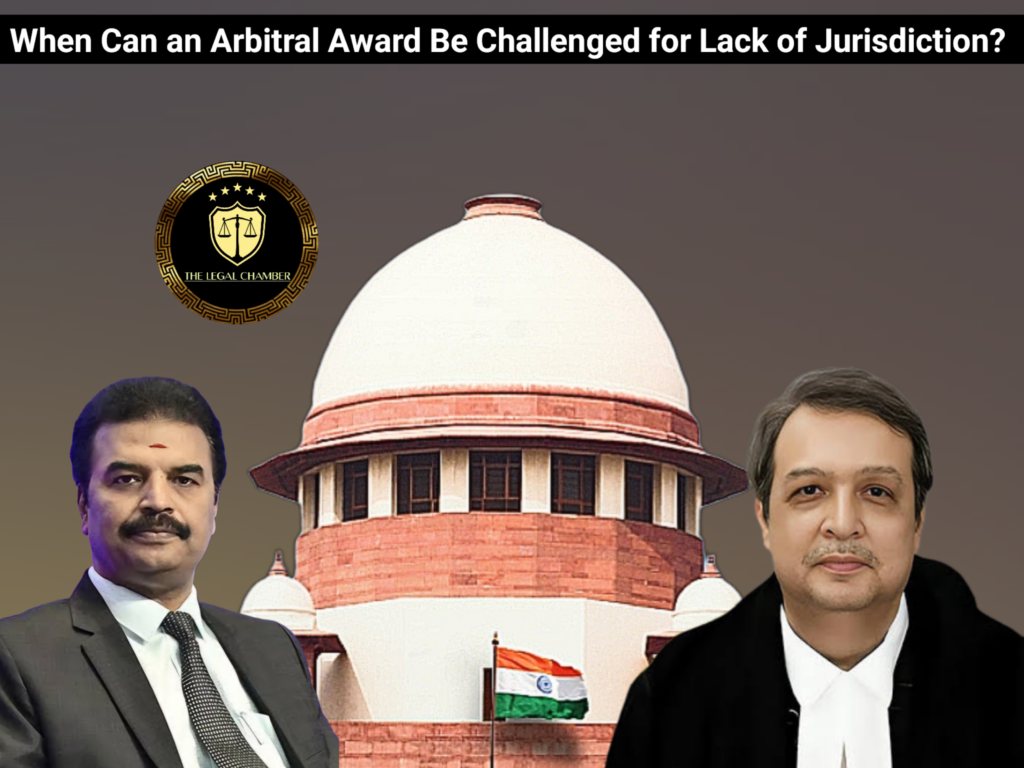
The Supreme Court ruled that an arbitral award under the Arbitration and Conciliation Act 1996, cannot be annulled solely for lack of jurisdiction if no plea was raised before the tribunal under Section 16(2). It harmonized conflicting precedents, holding that objections under Section 34 must show strong grounds, and upheld the finality of awards where jurisdictional challenges were untimely. The judgment clarifies that the Madhya Pradesh Arbitration Act 1983, does not automatically override arbitration agreements unless jurisdictional objections are raised at the appropriate stage.
Facts Of The Case:
The case involved a contractual dispute between M/s Gayatri Projects Limited and Madhya Pradesh Road Development Corporation regarding road construction works in Madhya Pradesh. The parties’ 2005 contract contained an arbitration clause under the Arbitration and Conciliation Act, 1996. When disputes arose in 2010 over additional costs due to tax changes, Gayatri invoked arbitration under the 1996 Act. The three-member tribunal unanimously awarded ₹1.04 crore to Gayatri in 2011. The Corporation initially challenged this award under Section 34 without raising jurisdictional objections. However, following subsequent Supreme Court judgments in VA Tech and L.G. Chaudhary cases (which held that the Madhya Pradesh Madhyastham Adhikaran Adhiniyam, 1983 governed such disputes), the Corporation amended its petition to challenge the tribunal’s jurisdiction. Both Commercial Court and High Court set aside the award, accepting this jurisdictional challenge. Before the Supreme Court, the key issue was whether an award could be annulled for lack of jurisdiction when no such objection was raised before the tribunal. The Court noted the Corporation’s failure to raise jurisdictional objections during arbitration or in its initial Section 34 petition, despite participating fully in the arbitral process. The judgment ultimately examined the interplay between the 1996 Act and state arbitration laws, and the consequences of delayed jurisdictional challenges.
Procedural History:
The case originated when M/s Gayatri Projects Limited initiated arbitration proceedings against Madhya Pradesh Road Development Corporation in 2010 under the Arbitration and Conciliation Act, 1996, following disputes over a 2005 works contract. The arbitral tribunal rendered its award in favor of Gayatri Projects on July 8, 2011. The Corporation challenged this award before the Commercial Court and 19th Additional Sessions Judge, Bhopal under Section 34 of the 1996 Act, which initially did not include jurisdictional objections. Following the Supreme Court’s judgment in L.G. Chaudhary (2018), the Corporation amended its petition to challenge the tribunal’s jurisdiction under the Madhya Pradesh Madhyastham Adhikaran Adhiniyam, 1983. The Commercial Court allowed this amendment and set aside the award on December 20, 2019. Gayatri Projects then appealed to the Madhya Pradesh High Court under Section 37, which dismissed the appeal on January 7, 2022, upholding the jurisdictional challenge. The matter finally reached the Supreme Court through a special leave petition (No. 9740 of 2022), where a division bench examined the conflicting precedents and procedural aspects of raising jurisdictional objections in arbitration matters. The Supreme Court’s May 15, 2025 judgment ultimately reversed the lower courts’ decisions, emphasizing the importance of timely jurisdictional objections in arbitration proceedings.
Court Observation:
The Supreme Court made several crucial observations in its judgment. It emphasized that a party’s failure to raise jurisdictional objections before the arbitral tribunal under Section 16(2) of the Arbitration and Conciliation Act, 1996 constitutes a waiver of such objections, preventing their later invocation under Section 34 proceedings. The Court harmonized conflicting precedents in VA Tech, L.G. Chaudhary, and Lion Engineering cases, clarifying that while jurisdictional objections can be raised under Section 34 as pure questions of law, they cannot become grounds for annulment if not raised at the appropriate stage. Significantly, the Court observed that the Madhya Pradesh Arbitration Act, 1983 does not automatically override arbitration agreements under the 1996 Act unless jurisdictional objections are timely raised. It distinguished between the right to raise jurisdictional objections and the consequences of failing to do so promptly, stressing that belated challenges cannot undermine arbitral awards’ finality. The judgment also noted that parties who fully participate in arbitration without raising jurisdictional objections are estopped from later challenging the tribunal’s authority, as this would contradict arbitration’s fundamental principles of finality and party autonomy. These observations reaffirmed the pro-arbitration stance of Indian courts while balancing statutory rights under both central and state arbitration laws.
Final Decision & Judgement:
The Supreme Court allowed the appeal and set aside the judgments of both the Commercial Court and High Court, restoring the arbitral award in favor of M/s Gayatri Projects Limited. The Court held that since the Madhya Pradesh Road Development Corporation had failed to raise any jurisdictional objection before the arbitral tribunal under Section 16(2) of the Arbitration and Conciliation Act, 1996, it could not subsequently challenge the award on this ground under Section 34. The Bench clarified that while jurisdictional objections can be raised as pure questions of law in Section 34 proceedings, they cannot become grounds for annulling an award if not raised at the appropriate stage. The Court remanded the matter to the Commercial Court to decide other pending challenges to the award, if any, while specifically excluding the jurisdictional objection. This judgment reaffirmed the principle of finality in arbitration proceedings and established that parties must raise all jurisdictional challenges during arbitration itself, failing which they would be deemed to have waived such objections. The decision harmonized conflicting precedents and provided clarity on the interplay between central and state arbitration laws in India.
Case Details:
Case Title: M/s Gayatri Projects Limited vs. Madhya Pradesh Road Development Corporation Limited Citation: (2025) INSC 698 Appeal No.: Civil Appeal No. 6856 of 2025 Date of Judgment: 15th May 2025 Judges/Justices Name: Justice J.B. Pardiwala & Justice R. Mahadevan
Download The Judgement Here